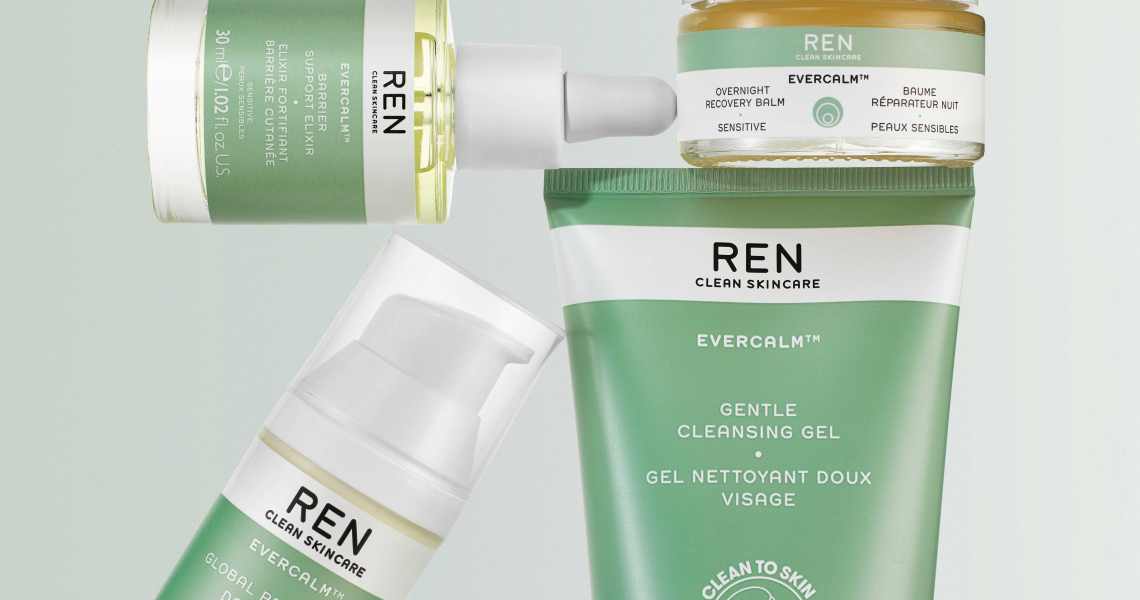U.K.-based prestige skin-care brand Ren is cutting down its product range and launch cadence and limiting its U.S. store footprint. The plan is to zero in on its 23-year reputation as a sensitive-skin brand en route to new levels of growth.
Targeting a 46% increase in yearly revenue from 2023-2027, Unilever-owned Ren has made big cuts to divert funds to new areas. That’s included leaning into its U.S. Sephora partnership, as well as leveraging customer data to tap into geographical growth opportunities and pull out of areas where the brand is over-penetrated. Texas and Florida are new targets, while stores in areas including New York’s Soho are closing.
Since 2009, the brand has been stocked in 34 U.S. Sephora stores, and it will expand to additional locations in the next couple of years. Unilever does not post brand revenues, but the brand sits in eight-digit territory. In addition, it is removing 29 products from its assortment, including the full Keep Young & Beautiful range and a range of acne products.
In 2022, the brand had 400 stores. The goal is to streamline its physical footprint to just Sephora and temporary partners over the next three years, with a new expansion plan set to roll out next year. At the same time, Ren will focus on building brand equity at Sephora, as well as entertainment-focused retail spaces like Showfields and pop-ups in lower-tier U.S. markets.
“We partnered with Sephora very intentionally because they are one of the best retailers to work with when you’re trying to build a category and [promote] messaging with a clear point of difference,” said CEO Michelle Brett, who joined Ren last year from fellow Unilever brand Living Proof.
Ren pulled out of many of the smaller e-tailers it was selling through last year due to their focus on discounting or inability to communicate the brand’s story.
Along with Sephora and its DTC channels, Ren is also prioritizing distribution through Amazon. Through ad keywords, it’s targeting consumers seeking skin-care products for challenging skin. “We find that we get a new consumer through Amazon, and we’re not discounting,” Brett said.
Ad position: web_incontent_pos1
In addition, Ren has a growing partnership with airline Virgin Atlantic, which offers its products in bathrooms and its member clubs. “Virgin is a brand that has hotels and cruise ships now, so there’s opportunity for us,” said Brett. “There are so many hotels that want sustainable, clean brands that are also gentle because they’re serving such a wide variety of consumers,” said Brett.
New revenue streams the brand is exploring include professional spas and salons, as well as travel retail. Skin sensitivity is heightened during travel and stressful times, Brett explained. Ren is also eying the body-care and fragrance categories, all while continuing to focus on sustainability, clean ingredients and sensitive skin-friendly formulas.
“Skin care for the body is now [rapidly] growing, and consumers are trading up from mass to prestige in the category,” said Brett. “So we want to grow our credibility there.” The global body-care market was valued at $26.9 billion in 2021 and was expected to expand at a compound annual growth rate of 5.9% from 2022 to 2028, according to a Grand View Research report.
Along with these changes, Ren has overhauled its staffing across marketing and creative to give the brand a more modern touch by bringing in new marketing and creative teams. “These people have dynamic backgrounds and a sense of building true brand equity, and they’re able to see Ren in a more modern way,” said Brett. “And most were fans of the brand in its early days — that passion is important.” In September, Aubrey Thu also joined from Living Proof, as director of retail sales and marketing.
The brand’s marketing messaging will move beyond a focus on the products’ compatibility with sensitive skin to also include before-and-after photos showing reduced redness and clinical study results showing improved hydration and brighter skin. Along with Instagram and TikTok, where its messaging is focused on sensitive skin expertise and community storytelling, Ren is testing new platforms including Threads to gain an early mover advantage. “Threads hasn’t become challenging; people are keeping it fun right now,” Brett said. To date, the brand’s content on Threads includes comedic posts and polls on which skin-care products people are using.
As the brand optimizes its operations to hit sales targets, data and AI are also being considered. As a sustainability-driven brand, using data to make the supply chain more efficient helps the business as well as its sustainability credentials. Ren used quantitative data on the amount of plastics it used, with the objective of reducing that amount, in line with its 2025 plastic reduction goals. Data was also used to make transportation routes more efficient as transport is typically one of the biggest carbon emitters.
Ad position: web_incontent_pos2
“The ‘datafication’ of sustainability is the next frontier – one, because of regulations, but also because it makes you smarter in the way you operate your business,” said Cara Smyth, senior managing director of ESG Retail at Accenture. Based on recent research, Smyth believes that brands could harness data to improve their business alongside their ESG credentials.
“Through Unilever Prestige, Ren has had the opportunity to spend a few days with a variety of AI experts to help us navigate that,” said Brett. The brand was acquired by Unilever in 2015 for an undisclosed sum. “One of those challenges is: How do you battle the algorithm to ensure that whatever you’re working on is kept confidential and doesn’t end up in that algorithm?” AI uses large-scale learning models (LLM), and some companies are now considering closed LLMs to keep their data confidential.




